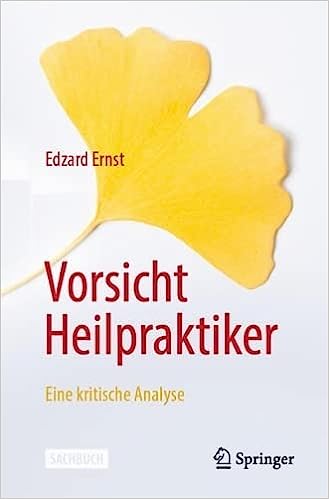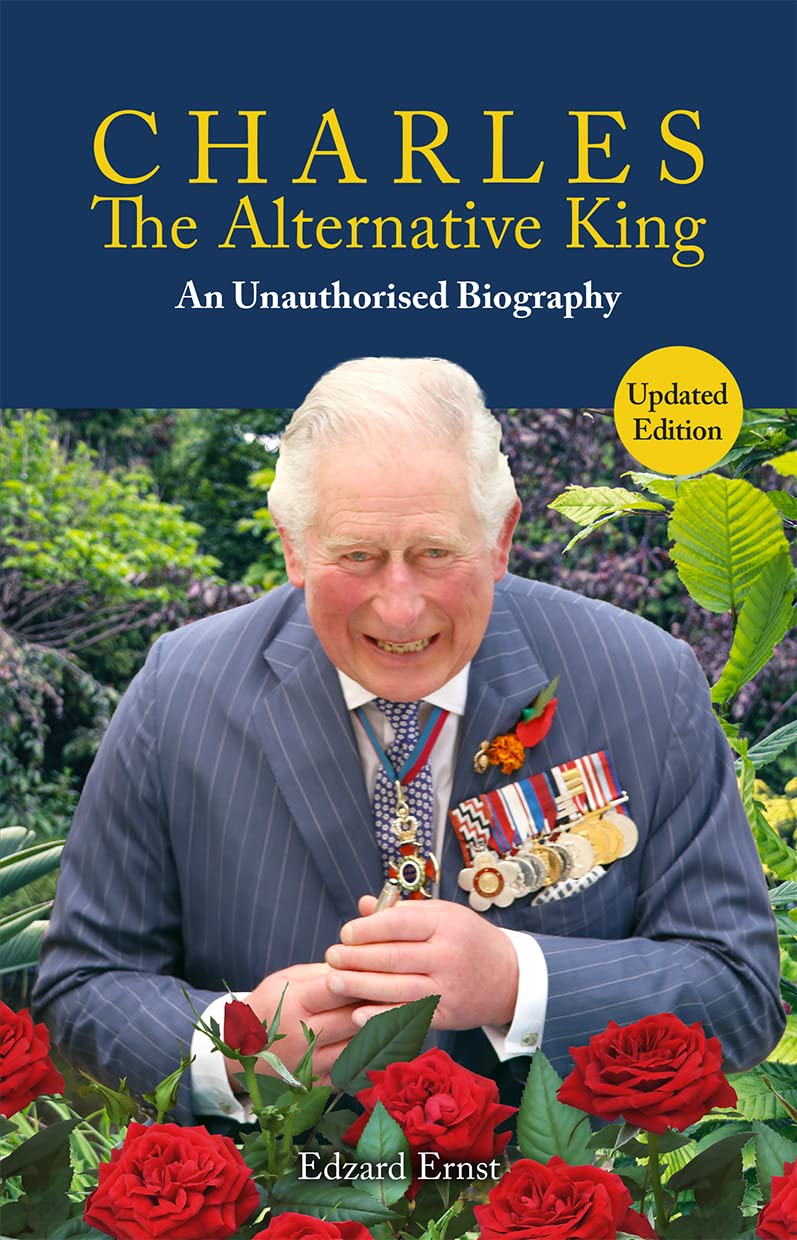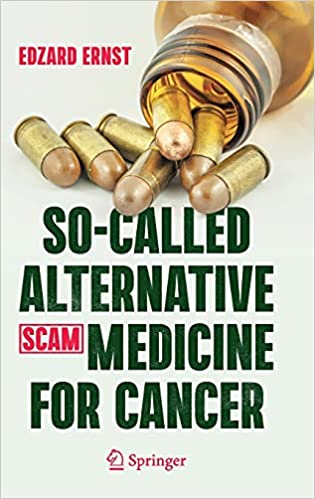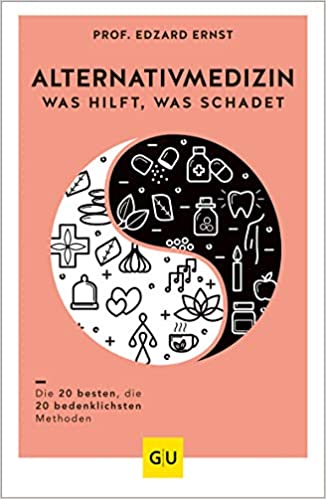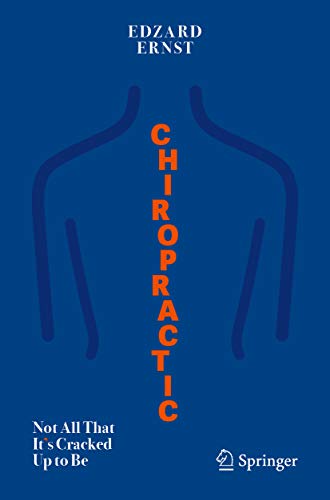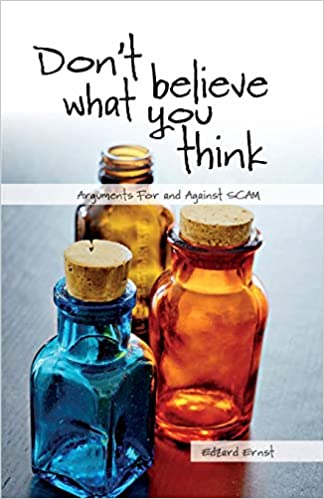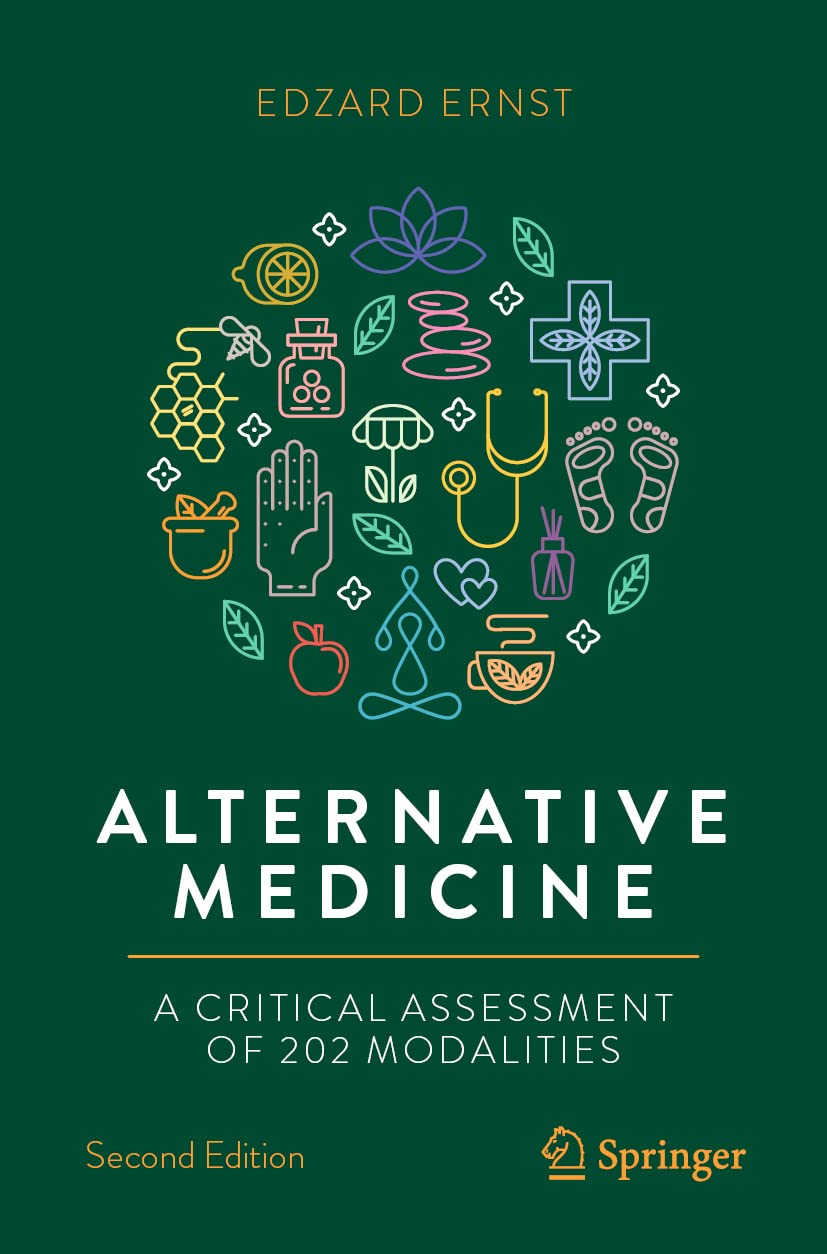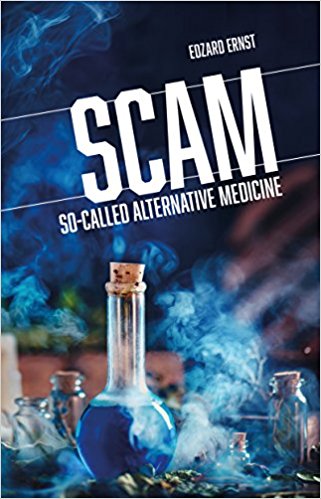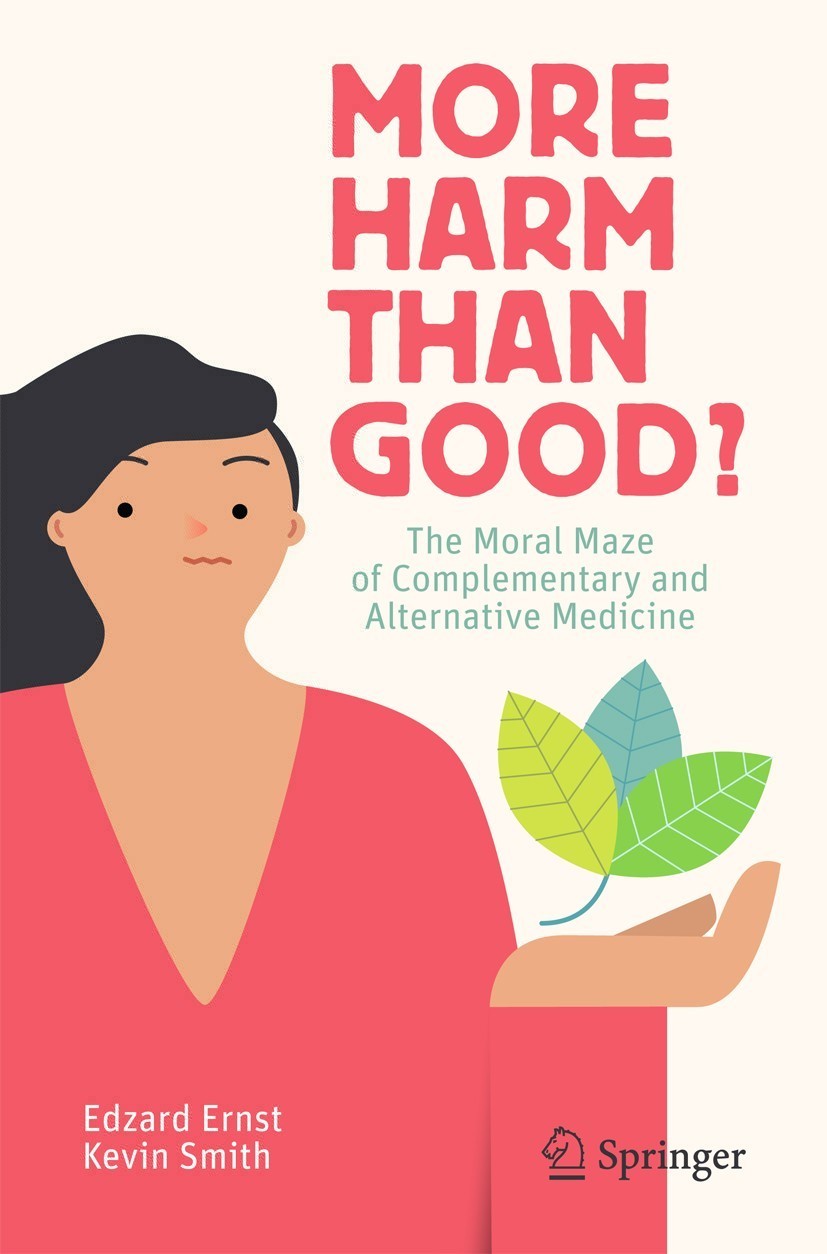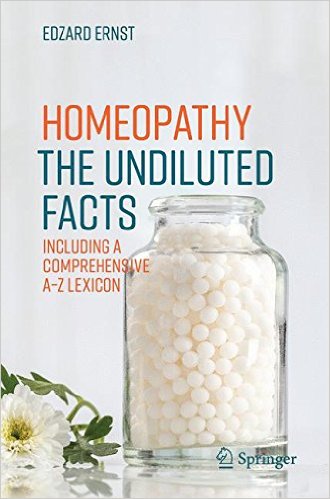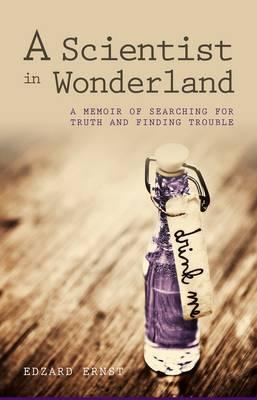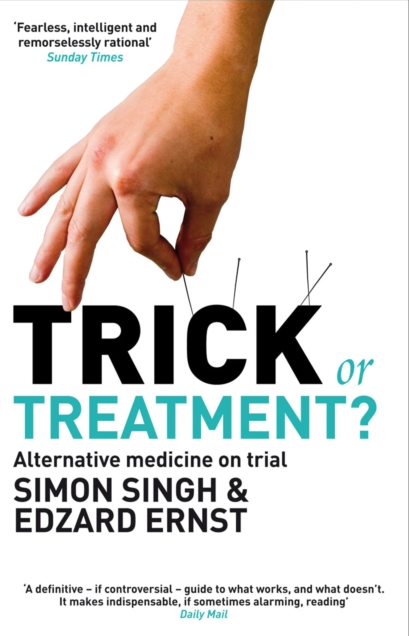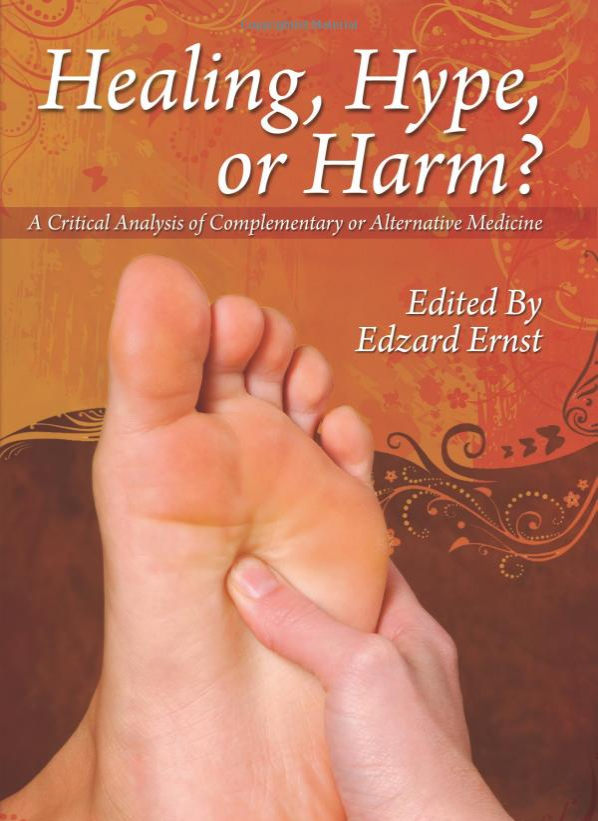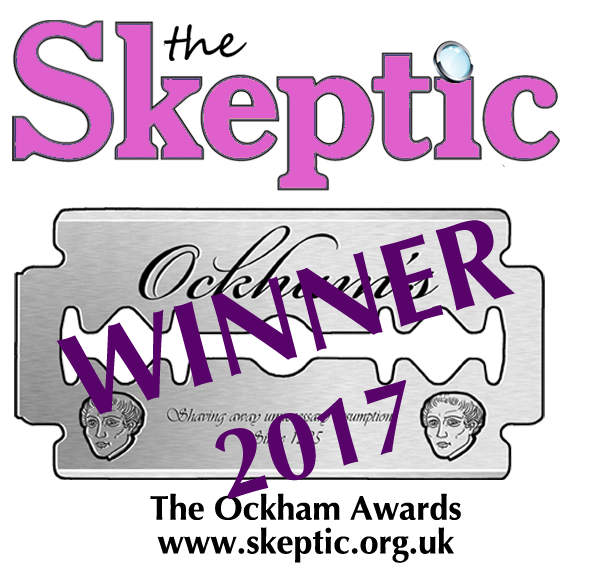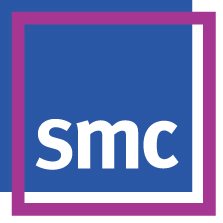Anyone who has looked into the discussions around homeopathy for more than 10 minutes will have come across Dana Ullman (DU). Some 15 years ago, I had the pleasure to meet him in person during a conference in Boston. After the brief chat, I asked a UK homeopath who this bizarre person was. “Oh Dana!” he replied “Dana is alright.”
But is he? Let’s have a look at the evidence.
There are very few papers by DU listed in Medline, and most of these articles are simply opinion pieces. The opinions DU expresses there (or anywhere else) are usually not supported by good evidence; some of them are even outright dangerous. Here are a few quotes:
“…homeopathic care is cost effective…”
“…homeopathic medicines are effective…”
“[There are]…significant effects of homeopathic treatment in allergic patients.”
Occasionally, DU writes little essays full of utter nonsense, logical fallacies and falsehoods for HUFFPOST where he is nevertheless characterised in glowing terms: Dana Ullman, M.P.H. (Masters in Public Health, U.C. Berkeley), CCH (Certification in Classical Homeopathy) is “homeopathic.com” and is widely recognized as the foremost spokesperson for homeopathic medicine in the U.S.
Wikipedia, however, is more critical and cites the opinion of a judge who was presiding over a class action against a US homeopathic producer in which DU had been called as an expert witness: The Defendant presented the testimony of Gregory Dana Ullman who is a homeopathic practitioner. He outlined the theory of homeopathic treatment and presented his opinion as to the value and effectiveness of homeopathic remedies. The Court found Mr. Ullman’s testimony to be not credible. Mr. Ullman’s bias in favor of homeopathy and against conventional medicine was readily apparent from his testimony. He admitted that he was not an impartial expert but rather is a passionate advocate of homeopathy. He posted on Twitter that he views conventional medicine as witchcraft. He opined that conventional medical science cannot be trusted…Mr. Ullman’s testimony was unhelpful in understanding the purported efficacy of the ingredients of SnoreStop to reduce the symptoms of snoring. Although he is familiar with the theory of homeopathic treatment, his opinions regarding its effectiveness was unsupported and biased. The Court gave no weight to his testimony.
The Encyclopedia of Americam Loons is even more poignant and describes DU as: A master of cognitive dissonance and memory bias, Ullman seems clinically unable to grasp the possibility that he may be wrong. Combined with a lack of understanding of science or medicine – and the possession of certain marketing skills – what we end up with is rather insidious.
Anyone who has debated with DU will have to concur with the claim that he fails to understand science or medicine. If you don’t believe me, please read his recent comments on the post about Prof Frass on this blog where he excels in producing one fallacy after the next (if he were on a mission to give homeopathy a bad name, he would be doing a sterling job!).
Despite all this abysmal ignorance, DU has one undisputed and outstanding talent: the knack of getting on people’s nerves and thus driving rational thinkers to distraction. In this way he even managed to be headlined as an ‘idiot‘!
I find it tempting to agree with the many experts who have called him an idiot, a moron or a laughing stock but, for now, I will resist that temptation. On the contrary, I want point out that he is much more cunning and clever than we give him credit for: after all, he runs a thriving business and lives off the nonsense he produces. To my mind, this is not idiotic; devious and unethical surely, but not idiotic nor laughable!
One of the most common claims of alternative practitioners is that they take a holistic approach to health care. And it is this claim which attracts many consumers. It also makes conventional medicine look bad, reductionist and inhuman, as it implies that mainstream medicine is non-holistic.
The claim can be easily disclosed to be a straw man, because all good medicine was, is and always will be holistic. Moreover, the claim amounts to a falsehood, because much of alternative medicine is everything but holistic. I will try to explain what I mean using the recent example of acupuncture for neck pain, but I could have used almost any other alternative treatment and any other human complaint/condition/disease:
- chiropractic for back pain;
- homeopathy for asthma;
- energy healing for depression;
- aromatherapy for jet lag;
- etc. etc.
The recent trial found that adding acupuncture to usual care yields a slightly better outcome than usual care alone. This is hardly a big deal; adding a good cup of tea and a compassionate chat to usual care might have done a similar thing. Acupuncturists, however, will say that their holistic approach is successful.
How holistic is acupuncture?
A ‘Western’ acupuncturist would normally ask what is wrong with the patient; in the case of neck pain, he would probably ask several further questions about the history of the condition, when the pain occurs, what aggravates it etc. Then he might conduct a physical examination of his patient. Eventually, he would get out his needles and start the treatment.
A ‘traditional’ acupuncturist would ask similar questions, feel the pulse, look at the tongue and make a diagnosis in terms of yin and yang imbalance. Eventually, he too would get out his needles and start the treatment.
Is that holistic?
Certainly not! If we look at alternative practitioners in general, we cannot fail to notice that they tend to be the very opposite of holistic. They usually attribute a patients illness to one single cause such as yin/yang imbalance (acupuncture), subluxation (chiropractic), impediment of the life force (homeopathy), etc.
Holistic means that the patient is understood as a whole person. Our neck pain patient might have physical problems such as muscular tension; the acupuncturists might well have realised this and placed their needles accordingly. But neck pain, like most other symptoms, can have many other dimensions:
- there could be stress;
- there could be an ergonomically disadvantageous work place;
- there could be a history of injury;
- there could be a malformation of the spine;
- there could be a tumour;
- there could be an inflammation;
- there could be many other specific diseases;
- there could be relationship problems, et. etc.
Of course, the acupuncturists will claim that, during an acupuncture session, they will pick up on all of these. However, in my experience, this is little more than wishful thinking. And even if they did pick up other dimensions of the patient’s complaint, what can they do about it? They can (and often do) give rather amateur advice. This may be meant most kindly but it is rarely optimal.
And what about conventional practitioners, aren’t they even worse?
True, there often is far too much room for improvement. But at least the concept of multifactorial conditions and treatments is deeply ingrained in everyone who has been to medical school. We learn that symptoms/complaints/conditions/diseases are almost invariably multifactorial; they have many causes and contributing factors which can interact in complex ways. Therefore, responsible physicians always consider to treat patients in multifactorial ways; in the case of our neck pain patient:
- the stress might need a relaxation programme,
- the work place might need the input of an occupational therapist;
- in case of an old injury, a physio might be needed;
- specific conditions might need to be seen by a range of medical specialists;
- muscular tension could be reduced by a massage therapist;
- relationship problems might require the help of a psychologist; etc. etc.
I am NOT saying that all of this is necessary in each and every case. But I am saying that, in conventional medicine, both the awareness and the possibility for a professional multidisciplinary approach is well established. You don’t believe me? Ask a physiotherapist or an occupational therapist who refers more patients to them, an acupuncturist or a GP!
Alternative practitioners claim to be holistic and some might even be aware of the complexity of their patients’ symptoms. But, at best, they have an amateur approach to this complexity by dabbling themselves in issuing more or less suited advice. They are not adequately trained to do this job, and they refer very rarely.
My conclusion: professional multidiscipinarity is an approach deeply engrained in conventional medicine (we don’t often call it holism, perhaps because many doctors associate this term with charlatans), and it beats the mostly amateurish pseudo-holism of alternative practitioners any time.
Homeopathy seems to attract some kind of miracle worker. Elsewhere I have, for instance, reported the curious case of Prof Claudia Witt who published more than anyone on homeopathy in recent years without hardly ever arriving at a negative conclusion. Recently, I came across a researcher with an even better track record: Prof Michael Frass.
Wikipedia describes his achievements as follows: “Michael Frass studied medicine from 1972 to 1978 at the Medical University of Vienna followed by visits abroad at the Pasteur Institute, Paris and at the Porter Memorial Hospital (USA). Since March 2004 he directs the Outpatients Unit of Homeopathy for Malign Diseases at the Department Clinic for Internal of Medicine I at the Medical University of Vienna. Since 2005 Frass also works as a coordinator of the lecture series Homeopathy at the Medical University of Vienna. Beginning with the winter semester 2001/02 he is the coordinator of a lecture series Basics and practise of complementary medical methods at the Medical University of Vienna. From 2002 to 2005 he led the Ludwig Boltzmanm Institute of Homeopathy. Since 2005 Frass is president of the Institute for Homeopathic Research. Actually he works at the Division of Oncology at the Department of Medicine I in Vienna. He is First Chairman of the Scientific Society for Homeopathy (WissHom), founded in 2010, president of the Umbrella organization of Austrian Doctors for Holistic Medicine.”
He directs the WHAT? The Outpatients Unit of Homeopathy for Malign Diseases at the Department Clinic for Internal of Medicine I at the Medical University of Vienna? This is my former medical school, and I had no idea that such a unit even existed – but, of course, I left in 1993 for Exeter (a few months ago, I followed an invitation to give a lecture on homeopathy at the Medical University of Vienna ; sadly neither Prof Frass nor anyone of his team attended).
And what about the Scientific Society for Homeopathy? I am sure that the name of this organisation will make some people wonder. From the society’s website, we learn that “the intention of WissHom is to contribute to the progress of medicine and to the collective good. To this end, WissHom intents to further develop homeopathy both practically and theoretically. It will be WissHom’s task to breathe life into this committed objective.”
Breathing life into homeopathy seems exactly what Prof Frass does. He seems to have found his way to homeopathy relatively late in his career (the 1st Medline-listed article was published only in 2003) but he has nevertheless published many studies on this subject (I use the term ‘study’ here to describe both clinical, pre-clinical and basic research papers); in total, I found 12 such articles on Medline. They cover extremely diverse areas and a wide range of methodologies. Yet they all have one remarkable feature in common: they arrive at positive conclusions.
You find this hard to believe? Join the club!
But it is undeniably true, here are the conclusions (or the bit that comes close to a conclusion) from the Medline-listed abstracts (only the headings in capital letters are mine, and they simply depict the nature of the paper)
AN RCT WITH CANCER PATIENTS (2015)
Results suggest that the global health status and subjective wellbeing of cancer patients improve significantly when adjunct classical homeopathic treatment is administered in addition to conventional therapy.
TWO CASE REPORTS OF HOMEOPATHICALLY TREATED INTOXICATIONS (2014)
Based on the 2 cases, including 1 extreme situation, we suggest that adjunctive homeopathic treatment has a role in the treatment of acute Amanita phalloides-induced toxicity following mushroom poisoning. Additional studies may clarify a more precise dosing regimen, standardization, and better acceptance of homeopathic medicine in the intensive care setting.
RETORSPECTIVE ANALYSIS OF CANER SURVIVAL UNDER HOMEOPATHIC TREATMENT (2014)
Extended survival time in this sample of cancer patients with fatal prognosis but additive homeopathic treatment is interesting. However, findings are based on a small sample, and with only limited data available about patient and treatment characteristics. The relationship between homeopathic treatment and survival time requires prospective investigation in larger samples possibly using matched-pair control analysis or randomized trials.
OBSERVATIONAL STUDY OF HOMEOPATHIC TREATMENT FOR ALLERGIES (2012)
The symptoms of patients undergoing homeopathic treatment were shown to improve substantially and conventional medication dosage could be substantially reduced. While the real-life effect assessed indicates that there is a potential for enhancing therapeutic measures and reducing healthcare cost, it does not allow to draw conclusions as to the efficacy of homeopathic treatment per se.
IN-VITRO STUDY OF THE EFFECTS OF HOMEOPATHICS ON HELIOBACTER PYLORI (2010)
The data suggest that both drugs prepared in ethanolic solution are potent inhibitors of H. pylori induced gene expression.
SYSTEMATIC REVIEW OF HOMEOPATHY FOR RESPIRATORY ALLERGIES (2010)
Most of these clinical studies have been deemed to be high quality trials, according to the three most commonly referenced meta-analyses of homeopathic research. Basic in vitro experimental studies also provide evidence that the effects of homeopathy differ from placebo.
CASE SERIES OF PATIENTS TREATED WITH HOMEOPATHIC PETROLEUM (2008)
This study is based on 25 well documented reports of cases which responded well to treatment with Petroleum.
ANIMAL EXPERIMENT WITH HOMEOPATHY ( 2008)
Animals treated with the standard test solution thyroxine 10(-30) metamorphosed more slowly than the control animals, ie the effect of the homeopathically prepared thyroxine was opposed to the usual physiological effect of molecular thyroxine.
OVERVIEW OF HOMEOPATHIC TREATMENT IN INTENSIVE CARE (2005)
Our report suggests that homeopathy may be applicable even for critically ill patients.
RCT OF HOMEOPATHY FOR SEVERE SEPSIS (2005)
Our data suggest that homeopathic treatment may be a useful additional therapeutic measure with a long-term benefit for severely septic patients admitted to the intensive care unit. A constraint to wider application of this method is the limited number of trained homeopaths.
RCT OF HOMEOPATHY FOR COPD (2005)
These data suggest that potentized (diluted and vigorously shaken) potassium dichromate may help to decrease the amount of stringy tracheal secretions in COPD patients.
ANIMAL STUDY OF A HOMEOPATHIC REMEDY (2003)
These animals reacted to the homeopathically prepared thyroxine with a slowing down of metamorphosis, even when they had not been prestimulated with a molecular dose of the hormone. This effect was observed in all 3 laboratories and is consistent with the results of previous studies.
Surprised?
So am I!
How can homeopathy produce nothing but positive results in the hands of this researcher? How can it work in so many entirely different conditions? How is it possible that homeopathic remedies are better than placebo regardless of the methodology used? Why does homeopathy, in the hands of Prof Frass, not even once produce a result that disappoints the aspirations of homeopaths and its advocates? Why are these sensational results almost invariably published in very minor journals? Crucially, why has not one of the findings (as far as I can see) ever been independently reproduced?
I do not know the answers to these questions.
If anyone does, I would like to hear them.
I had thought that I know most alternative therapies. However, Shujing massage was new to me. It seems to be a massage technique from Traditional Chinese Medicine (TCM) along the Yin/Yang concept; a bit like Shiatsu perhaps.
Does it work?
This study might easily be the first to address this question. It was aimed at comparing the efficacy on insomnia between shujing massage therapy and medication with estazolam.
Eighty patients with insomnia were randomized into a shujing massage therapy group and a medication group. The massage was applied along the gallbladder meridian on the temporal area. Pressing and kneading manipulations were performed at Yangbai (GB 14), Benshen (GB 13), Toulinqi (GB 15), Zhengying (GB 17), Chengling (GB 18), Shuaigu (GB 8), and Fengchi (GB 20), etc. one minute at each acupoint. In the medication group, 1 mg estazolam was administered orally half an hour before sleep. The treatments were given once every day in both groups. After one month, the sub-scores and the total score of the Pittsburgh sleep quality index scale (PSQI) and the clinical efficacy were compared between the two groups.
After the intervention, the each sub-score of PSQI was improved as compared with that before treatment in the patients of the two groups. The differences in sleep time and the time for falling into sleep were not significant between the two groups. In the shujing massage group, the scores of sleep quality, sleep efficiency, sleep disturbance and daytime dysfunction, as well as the total score were all lower than those in the medication group. The response rate was 92.1% (35/38) in the shujing massage group and 84. 2% (32/38) in the medication group.
The Chinese authors concluded that Shujing massage therapy achieves the superior efficacy on insomnia compared with the oral administration of estazolam.
Sadly, this study is less conclusive as TCM-enthusiasts may think:
- the study was not blind; therefore placebo-effects might have produced a false-positive result;
- any massage is relaxing; therefore the effect could be entirely unrelated to TCM-philosophy;
- it is likely that the regular ritual of a massage has a beneficial effect on sleep;
- before we agree with these findings, we should insist on an independent confirmation via a more rigorous study.
I think that, before we accept the ‘efficacy’ of this TCM-treatment, we should see much more convincing evidence.
Homeopathy has its fair share of lunes who are unable to make a reasonable case for it without telling overt falsehoods; we have seen some of then on this blog, for sure. Therefore I was encouraged to finally find a well-argued, rational defence of homeopathy. It comes from an unlikely source – Christian Boiron (CB) is the General Manager of the world’s largest manufacturer of homeopathics ‘BOIRON’ with a turn-over of more than 600 million Euros annually. Some would have thought he could be a trifle biased, but no – judge for yourself.
In a recent, short interview (unfortunately it is in French, so you have to trust my translations) CB rightly pointed out that “Il y a un Ku Klux Klan contre l’homéopathie” THERE IS A KU KLUX KLAN AGAINST HOMEOPATHY. About time that someone calls a spade a spade, I’d say. I think others have previously called those who doubt the miracle of homeopathy ‘fascists’ – but ‘KKK’ is much better, more to the point. Sceptics have indeed a long and infamous habit of stringing everyone who disagrees with their views up on a tree.
The interview refers to the report from the Australian NHMRC which showed that homeopathy is not effective and can even be dangerous. How can this be? Fortunately CB knows the answer: “…personne ne comprend rien”. The panel members were all ignorant! Thanks for clearing that up CB; were they also members of the KKK?
After all, homeopathy is 200 years old, it is now well-grounded in science and accepted throughout the world (“L’homéopathie, qui a 200 ans, évolue avec les connaissances de la science. La France l’a relancée dans un axe totalement scientifique et lui a donné une reconnaissance mondiale”) That surely needed to be said, and don’t you KKK members dare pointing out the occasional fallacy here! Because CB is the first to be critical (“Je suis le premier à être le plus critique”).
What about studies of homeopathy that fail to be as convincingly positive as CB might have hoped? “Quand on dit qu’il faut démontrer en médecine et que la médecine est une pratique scientifique ce sont deux idioties.” Yes, well said CB, the assumption that medicine should become scientific is indeed idiotic. Medicine is about individuals, not statistics; Hahnemann realised this, of course, and thus showed us the way to the future in health care.
And to finish this elating encounter with one of the brightest buttons in any homeopathic drawer: “On croit savoir énormément de choses alors qu’il y a beaucoup qu’on méconnait”. ONE THINKS ONE KNOWS A LOT BUT THERE IS PLENTY ONE MISUNDERSTANDS”
I think even those terrible KKK members amongst my readers might agree with CB here, particularly if this remark introspectively refers to himself.
***a note to homeopaths and their libel lawyers: this post is SATIRE
No, I kid you not!
This abstract was actually published in the leading chiro-journal. The authors include three professors from the Canadian Memorial Chiropractic College, Research, Toronto, Canada. Its title is impressive but made my alarm bells ring a bit:
A Randomized Pragmatic Clinical Trial of Chiropractic Care for Headaches With and Without a Self-Acupressure Pillow.
And the actual texts does not disappoint those looking for of pure pseudo-science:
The purpose of this study was to determine if the addition of a self-acupressure pillow (SAP) to typical chiropractic treatment results in significantly greater improvement in tension-type and cervicogenic headache sufferers.
METHODS:
A pragmatic randomized clinical trial was conducted in a chiropractic college teaching clinic. Thirty-four subjects, including tension-type and cervicogenic headache sufferers, 21 to 60 years of age, male or female, completed the study. Group A (n = 15) received typical chiropractic care only (manual therapy and exercises), and group B (n = 19) received typical chiropractic care with daily home use of the SAP. The intervention period was 4 weeks. The main outcome measure was headache frequency. Satisfaction and relief scores were obtained from subjects in the SAP group. Analysis of variance was used to analyze the intergroup comparisons.
RESULTS:
Owing to failure of randomization to produce group equivalence on weekly headache frequency, analysis of covariance was performed showing a trend (P = .07) favoring the chiropractic-only group; however, this was not statistically significant. Group A obtained a 46% reduction of weekly headache frequency (t = 3.1, P = .002; d = 1.22). The number of subjects in group A achieving a reduction in headaches greater than 40% was 71%, while for group B, this was 28%. The mean benefit score (0-3) in group B of the use of the SAP was 1.2 (.86). The mean satisfaction rating of users of the SAP was 10.4 (2.7) out of 15 (63%).
CONCLUSION:
This study suggests that chiropractic care may reduce frequency of headaches in patients with chronic tension-type and cervicogenic headache. The use of a self-acupressure pillow (Dr Zaxx device) may help those with headache and headache pain relief as well as producing moderately high satisfaction with use.
Where to begin?
Perhaps it is best, if I simply concentrated on the bizarre research question: is chiropractic care plus the largely uncontrolled use of an ‘acupressure cushion’ better than chiropractic care alone? To savour the lunacy of it, we need to consider that:
- chiropractic is not plausible;
- chiropractic care is not proven to be effective for headaches;
- acupressure is not plausible;
- acupressure is not proven to be effective;
- a self-administered acupressure cushion is also unproven and even less plausible;
This, I fear, renders the study one of the most nonsensical trials I have seen for a very long time. To make the bonanza in pseudo-science complete, the article is supplemented with a most bizarre conclusion about the effectiveness of chiropractic (which, of cause, cannot be examined in a trial of chiro vs chiro).
All this leads me to fear that:
- the best journal of chiropractic is rubbish;
- a professorship in a chiro school may not mean that the professor has the slightest idea about research methodology;
- chiropractors will try to squeeze a conclusion that is favourable for their trade even out of a dead horse.
We could have expected it, couldn’t we? With so much homeopathy in the press lately, Dr Dixon (we have seen him on this blog before, for instance here, here and here) had to comment. His article in yesterday’s NURSING IN PRACTICE is far too perfect to abbreviate it; I just have to cite it in full (only the reference numbers are mine and refer to my comments below).
HERE WE GO
Should homeopathy be blacklisted in general practice?
I have not prescribed them myself but I know of many GPs and patients who find homeopathic preparations helpful, especially in clinical areas where there is no satisfactory conventional treatment [1]. They are cheap and entirely safe [2], which cannot always be said of conventional treatment [3]. Is the concern about cost? That is implausible as GP prescriptions cost a mere £100,000 per annum, approximately £10 per UK General Practice but effectively less as some patients will be paying for them and they may reduce other prescriptions or medical costs [4]. Is it about evidence? [5] Possibly, and that is because the necessary pragmatic trials on comparative cost effectiveness have never been done [6]. Homeopathy thus joins the frequently quoted 25% of general practice activity that has an insufficient evidence base… So, why not do the research rather than single out homeopathy for blacklisting [7]? Apparently, because it irritates a powerful fraternity of “scientists” [8] with a narrow biomedical perspective on health and healing, who feel the need to impose their atheism [9] on others. They seem opposed to “patient-centred medicine” which factors in the mindset, culture, history, wishes and hopes of each patient, and a wider concept of science that might take account of them [10]. Led by the World Health Organization, many countries are examining the appropriate role of complementary and traditional medicine (CAM). Indian Prime Minister Modi has created the first minister for medicine in this area (called AYUSH with the “H” standing for homeopathy). Australia, whose government and medical deans (unlike the UK ) are not intimidated by this breed of scientific fundamentalism, has invested money in research, regulated its herbal [11] practitioners and created important trade links with China in this area [12]. Meanwhile the UK invests 0% of its research budget on CAM and appears to have a closed mind [13]. General practice is at its best a subtle and complex blend of science and art combined in a heady mixture, which recognises personal belief and perspective and respects differences [14]. Blacklisting homeopathy would be the thin edge of the wedge. It would be a mean-minded act of outside interference by many who do not treat patients themselves, denying patient choice and signifying a new age of intolerance and interference [15]. It is a threat to the autonomy of general practice that should concern every GP and patient whatever their views on homeopathy [16].
About the Author
Chairman of the NHS Alliance and a GP
Mike Dixon, chairman of the NHS Alliance and a GP at College Surgery in Cullompton, Devon and a Royal College of General Practitioners presidential candidate.
END OF QUOTE AND BEGINNING OF MY DELIBERATELY BRIEF COMMENTS
- Whenever this argument comes up, people fail to cite an example. Are they afraid that we would point out what can be done for such a patient other than prescribing placebos?
- Actually, they are extremely expensive considering that they are just lactose or water. And the claim that homeopathy is safe merely displays an embarrassing lack of knowledge; see the many posts on this blog that deal with this issue.
- Classical ‘tu quoque’ fallacy; display of the ignorance of the risk/benefit concept for judging the value of medical interventions.
- Display of ignorance regarding the actual evidence, see here, for instance.
- Yes, it’s the evidence but also it’s the biological implausibility and the fact that disregarding it undermines rationality in general.
- Pure ignorance again, see my point 4.
- Are ~ 300 clinical trials and about 100 systematic reviews not enough? How much more money needs to be wasted?
- It seems that Dixon has a problem with science and those who pursue it to improve future health care for the benefit of patients.
- Does Dixon admit that homeopathy is a religion?
- Patient-centred medicine which factors in the mindset, culture, history, wishes and hopes of each patient, and a wider concept of science that might take account of them – does Dixon not know that all good medicine fits this description, but homeopathy certainly does not?
- Every one with an IQ above 50 knows by now that herbal is not homeopathic; is Dixon the exception?
- What about the Australian report which concluded that “Homeopathy should not be used to treat health conditions that are chronic, serious, or could become serious. People who choose homeopathy may put their health at risk if they reject or delay treatments for which there is good evidence for safety and effectiveness. People who are considering whether to use homeopathy should first get advice from a registered health practitioner. Those who use homeopathy should tell their health practitioner and should keep taking any prescribed treatments.”
- This is simply not true, and Dixon should know it.
- No reason to include disproven nonsense like homeopathy.
- Intolerance is on Dixon’s side, I think. Improving health care by abandoning disproven therapies in favour of evidence-based treatments is no interference, it’s progress.
- This can only be true, if we misunderstand autonomy as arbitrariness without rules, checks, ethics and controls. Good general practice has, like all medicine, be in the best interest of patients. An obsolete, expensive, unsafe, ineffective and implausible treatment is clearly not.
Not long ago, Peter Fisher fired me from the editorial board of ‘his’ journal ‘HOMEOPATHY’. I thought that this was a surprisingly daft move, particularly as we used to have respect for each other and even published together as co-authors (for instance here). But perhaps I should not have been surprised because, already in 2007, he published an important, potentially libellous falsehood about me.
In this article which he published as Dr. Peter Fisher, Homeopath to Her Majesty, the Queen, he wrote: There is a serious threat to the future of the Royal London Homoeopathic Hospital (RLHH), and we need your help…Lurking behind all this is an orchestrated campaign, including the ’13 doctors letter’, the front page lead in The Times of 23 May 2006, Ernst’s leak of the Smallwood report (also front page lead in The Times, August 2005), and the deeply flawed, but much publicised Lancet meta-analysis of Shang et al…
If you have read my memoir, you will know that even the hostile 13-months investigation by my own university did not find me guilty of the ‘leak’. The Times journalist who interviewed me about the Smallwood report already had the document on his desk when we spoke, and I did not disclose any contents of the report to him. But the truth in homeopathy seems often highly diluted.
More recently, Peter Fisher could be heard on UK radio and TV (for instance here) making further claims which, in my view, are false. Specifically, I am thinking of two of his statements which would mislead the public, if they stood uncorrected:
- He said that the studies unanimously show that integrating homeopathy into conventional medicine improves outcomes and saves money.
- He also claimed that most of the homeopathic remedies available in the high street still contain small amounts of active ingredients.
POINT NUMBER 1
It seems obvious that adding homeopathy with its lengthy, compassionate encounters to conventional care can easily generate positive outcomes. But costs? I don’t see unanimously positive evidence here at all.
Dr Fisher must know the literature on homeopathy very well. Therefore I assume that he is aware of the most up-to-date systematic review of economic evaluations of this subject. Its authors from the ‘School of Health and Related Research’, University of Sheffield concluded that “it is… not possible to draw firm conclusions based on existing economic evaluations of homeopathy“.
Fisher knows and likes to quote Claudia Witt’s work on homeopathy. Why does he not cite this recent paper then?
OBJECTIVES:
The aim of this study was to compare the health care costs for patients using additional homeopathic treatment (homeopathy group) with the costs for those receiving usual care (control group).
METHODS:
Cost data provided by a large German statutory health insurance company were retrospectively analysed from the societal perspective (primary outcome) and from the statutory health insurance perspective. Patients in both groups were matched using a propensity score matching procedure based on socio-demographic variables as well as costs, number of hospital stays and sick leave days in the previous 12 months. Total cumulative costs over 18 months were compared between the groups with an analysis of covariance (adjusted for baseline costs) across diagnoses and for six specific diagnoses (depression, migraine, allergic rhinitis, asthma, atopic dermatitis, and headache).
RESULTS:
Data from 44,550 patients (67.3% females) were available for analysis. From the societal perspective, total costs after 18 months were higher in the homeopathy group (adj. mean: EUR 7,207.72 [95% CI 7,001.14-7,414.29]) than in the control group (EUR 5,857.56 [5,650.98-6,064.13]; p<0.0001) with the largest differences between groups for productivity loss (homeopathy EUR 3,698.00 [3,586.48-3,809.53] vs. control EUR 3,092.84 [2,981.31-3,204.37]) and outpatient care costs (homeopathy EUR 1,088.25 [1,073.90-1,102.59] vs. control EUR 867.87 [853.52-882.21]). Group differences decreased over time. For all diagnoses, costs were higher in the homeopathy group than in the control group, although this difference was not always statistically significant.
CONCLUSION:
Compared with usual care, additional homeopathic treatment was associated with significantly higher costs. These analyses did not confirm previously observed cost savings resulting from the use of homeopathy in the health care system.
To speak about unanimously positive evidence is simply not true! And Fisher, I suspect, must know it.
POINT NUMBER 2
This point is even clearer, I think. The most commonly used homeopathic potency is surely a ’30C’ – it was already Hahnemann’s favourite. A small statistic proves my point: of the 24 products listed on the Nelson site, 21 are ’30C’ and just three are ‘6C’. For Ainsworths, all 33 of their listed standard products are ’30C’. Helios have 70 ’30C’ products and 27 ‘200C’ products
The likelihood that a ’30C’ contains a single molecule of what it says on the bottle is precisely zero. In fact, this applies already to all remedies beyond ’12C’. Fisher knows that, of course, I assume; if not he should not be a homeopath.
MY CONCLUSION OF ALL THIS
I do not take any pleasure in calling anyone a liar – and it is, of course, far from me to use this word in connection with the Queen’s homeopath. Therefore, in the interest of the scientific truth, medical ethics and honesty, I would like to give Dr Fisher the opportunity to comment on the above issues and herewith invite him to correct the three errors/falsehoods/inaccuracies/misunderstandings mentioned above by supplying the evidence for his statements or by withdrawing them. Then we won’t have to call him names which he might feel are hurtful.
A friend alerted me to this website: Hungarian Academy of Sciences statement proposing the same scientific standards for homeopathic drug registration as for normal drugs
Members of the Section of Medical Sciences of the Hungarian Academy of Sciences (HAS) voted unanimously on 9 November 2015 for supporting the earlier proposal of the Royal Swedish Academy of Sciences. The Swedish statement requested that the homeopathic remedies should go through the same efficacy trials as normal drugs should.
The Hungarian statement refers to various recent scientific statements for example to the study of the Australian Government’s National Health and Medical Research Council that analysed 175 publications and concluded that there was no reasonable scientific proof for the efficacy of homeopathy for any health conditions. The HAS also refers to the European Academies Science Advisory Council that is allegedly considering an investigation among the academies of the UN countries about this topic. The statement points out that another Hungarian scientific body (Health Science Committee – Egészségügyi Tudományos Tanács) had made a similar statement already in 1991 and opposed using and registering those drugs for that efficacy had not been proved and that had not gone through adequate research procedures.
József Mandl – biochemist, member of HAS, president of Health Science Committee said: “The Australian and Swedish statements had raised the interest of the Hungarian scientific community and now members of the Medical Sciences Section of the Hungarian Academy of Sciences voted unanimously to join the Swedish initiation… Science has well defined, rigorous methods and systems. Homeopathy can’t be fitted to these. Homeopathic remedies don’t meet the criteria of evidence based medicine. There might be various hypotheses, theories, but everything should be proved. This is what science means and this is what we would like to highlight now.”
Well said, indeed!
It is high time that the authorities concede that there can be only one standard in medicine regulation. The ‘free ride’ homeopathy has had for 200 years must now come to an end.
This notion also seems to be increasingly supported by the legal profession. An Australian lawyer just published this abstract:
The 2010 report of the United Kingdom Science and Technology Committee of the House of Commons and the 2015 report of the Australian National Health and Medical Research Council have overtaken in significance the uncritical Swiss report of 2012 and have gone a long way to changing the environment of tolerance toward proselytising claims of efficacy in respect of homeopathy. The inquiry being undertaken in the United States by the Food and Drug Administration during 2015 may accelerate this trend. An outcome of the reports and inquiries has been a series of decisions from advertising regulators and by courts rejecting medically unjustifiable claims in respect of the efficacy of homeopathy. Class actions have also been initiated in North America against manufacturers of homeopathic products. The changing legal and regulatory environment is generating an increasingly scientifically marginalised existence for homeopathy. That new environment is starting to provide effective inhibition of assertions on behalf of homeopathy and other health modalities whose claims to therapeutic efficacy cannot be justified by reference to the principles of evidence-based health care. This has the potential to reduce the financial support that is provided by insurers and governments toward homeopathy and to result in serious liability exposure for practitioners, manufacturers and those who purvey homeopathic products, potentially including pharmacists. In addition, it may give a fillip to a form of regulation of homeopaths if law reform to regulate unregistered health practitioners gathers momentum, as is taking place in Australia.
As though this is not enough, today it was reported that the UK NHS is considering to blacklist homeopathic remedies:
The Good Thinking Society has been campaigning for homeopathy to be added to the NHS blacklist – known formally as Schedule 1 – of drugs that cannot be prescribed by GPs. Drugs can be blacklisted if there are cheaper alternatives or if the medicine is not effective. After the Good Thinking Society threatened to take their case to the courts, Department of Health legal advisers replied in emails that ministers had “decided to conduct a consultation”. Officials have now confirmed this will take place in 2016.
It seems to me that the position of homeopathy as a form of health care is less and less tenable. Its place is in the history books. To satisfy the need for consumer/patient choice, the remedies should be moved to the confectionary shelves of the supermarkets.
Having just finished reading an ‘satirical esothriller’ entitled ‘VIER FRAUEN UND EIN SCHARLATAN’ (it’s a good book but it’s in German, I’m afraid), I have been thinking more than usual about charlatans. A charlatan is defined as a person who falsely pretends to know or be something in order to deceive people. In the book, the charlatan character is deliberately exaggerated as a dishonest, immoral crook. I have met such people; in fact, I have met plenty of such people in alternative medicine. But I have to admit that, in my experience, there are other charlatans too; in particular, I am talking of ‘honest’ quacks who pretend to know while also being utterly convinced to know.
Come to think of the categories of charlatans, I think the matter is really quite simple: as far as I can see, in alternative medicine, there are essentially just two types.
THE CROOK
This type of charlatan is the one we think of first when we mention the term. He (usually it’s a male) has a range of remarkable features:
- he is dishonest;
- he is entirely rational;
- he knows about evidence and has prepared all the necessary pseudo-arguments to belittle science vis a vis his followers;
- he is only interested in himself;
- he is immoral;
- he wants to make money;
- he employs all the means available to achieve his aims, including PR, advertising, branding, merchandising etc.
- he does not believe in his ‘message’;
- he systematically studies and exploits his target group;
- he does not live by his own rules;
- when he is implicated in harming a patient, he consults his lawyers;
- he is cynical;
- his ‘charisma’, if he has any, is well-studied and extensively rehearsed;
- when challenged, he sues.
THE FANATCIST
This type is very different from the crook and would be deeply shocked by the crook’s behaviour and attitude. She (often it is a female) can be described as follows:
- she is convinced to be profoundly honest;
- she is deluded, often to the point of madness;
- she ignores the evidence totally and argues that science is just one of several ways of knowing;
- she feels altruistic;
- she thinks she is on the moral high ground;
- she is not primarily out to make money and might even offer her services for free;
- she does not seek fame;
- she is religiously convinced of the correctness of her message and wants to save mankind through it;
- her message is for everyone;
- she strictly adheres to her own gospel and thinks that those who don’t are traitors;
- when she is implicated in causing harm, she consults her ueber-guru;
- she abhors cynicism;
- her charisma, if she has any, is real and a powerful tool for convincing followers;
- when challenged, she feels hurt and misunderstood.
As I indicated already, this is a SIMPLE classification. Between the two extremes, there are all shades of grey. In fact, it is a continuous spectrum.
Why should any of this be important?
Charlatans of both types cause immeasurable harm, and it is impossible to decide which type is more dangerous. Our aim must be to prevent or minimise the harm they do. I think, this aim can best be pursued, if we know who we are dealing with. Identifying where precisely on the above scale a particular charlatan or quack is situated, might help in the prevention of harm.
